
September 25

1914 World War I: List Regiment (Sep 1-Oct 7): Infantry recruit Adolf Hitler's regiment continues a short but intensive basic training program, which is held in the premises of a large public school on the Elizabeth Platz in Munich. Hitler receives the first uniform of his life; basic greenish-grey with an "RIR 16" sown in red unto the epaulettes and a red stripe down the side of the trousers. The trousers are tucked into new leather boots, topped by a thick leather belt around the waist of the uniform jacket. [For further details, Click here.]
1915 World War I: Various:On September 25, 1915, following a four-day artillery bombardment along a six-and-a-half-mile front, British forces launch an attack on German positions at Loos, Belgium, beginning the Battle of Loos.
The British attack at Loos, led by Sir Douglas Haig, commander of the 1st Army of the British Expeditionary Force (BEF), comprised half of a simultaneous Allied offensive begun in two separate regions: as the British proceeded at Loos, the French attacked the German lines at Champagne and at Vimy Ridge in the Arras region of France. Aimed at relieving Russian distress on the Eastern Front by diverting German resources, the ambitious joint offensive counted on superior numbers . . . .
Despite Allied numerical superiority, the Germans were able to successfully defend their positions against both the British and the French, aided by a second line of trenches and weapons they had constructed five to six miles behind the front lines, shielded from the enemy artillery and out of range of observation. Joffre, for one, tried to justify the offensive's lack of progress, proclaiming that "We shall kill more of the enemy than he can kill of us." This rationale of attrition would be invoked often throughout the rest of the war, on both sides of the lines. In this case, however, German casualties during the offensive totaled only 60,000, while combined Allied casualties reached a quarter of a million.
At Loos, the British employed poisonous gas for the first time in the war, releasing some 150 tons of chlorine from over 5,000 gas cylinders across no-man's land. The gas failed, however, to reach the German trenches and inflict any significant damage. By the time the attacks were called off, death tolls at Loos exceeded those of any previous battle: of the nearly 10,000 British soldiers who attacked, 385 officers and 7,861 enlisted men were killed. Haig blamed the BEF's commander in chief, Sir John French, for failing to commit reserve troops in time to aid the 1st Army at Loos. Invoking this failure, and using his influence with King George V, Haig managed to get French recalled and himself elevated to the position of commander in chief in December 1915. [For further details, Click here.]
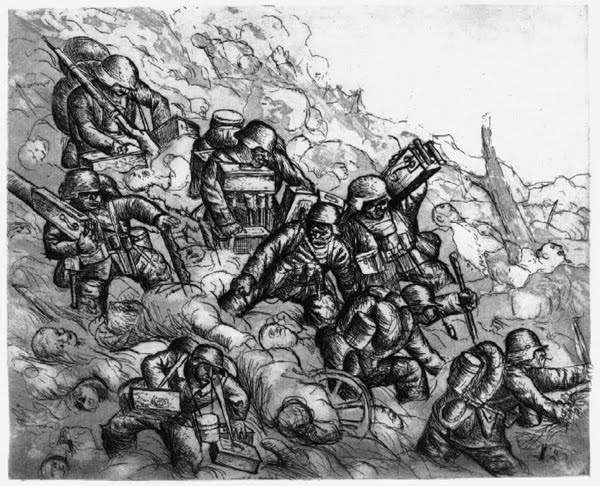
Stones and iron fragments whizzed above our heads. We bent low, racing across open country. I could scarcely lift myself from the ground any more [and] still Hitler urged me onwards, onwards! I cannot understand how Hitler could look around, with no cover . . . while calling to me: "Brandmoari, get up!" He seemed without nerves . . . . Sweat dug deep rivulets into our faces. More falling than running we reached the command dugout. Paralyzing tiredness weighed like lead on my burning limbs. I threw off my helmet and webbing and sank dead tired into my bunk. I expected Adolf to do the same, but how wrong I was! As I turned around, I saw him sitting near the exit, helmet on head, buckled up and waiting for the next order. "You're crazy!" I cried out angrily. "How would you know" was his prompt reply. There was no man under his uniform, only a skeleton . . . . He had an iron nature.
Alexander Moritz Frey, in 1946, will recall his wartime encounters with Adolf Hitler:Although we were assigned different duties, we encountered one another quite often. Taken out of our companies, we were both assigned to regimental HQ . . . . As a subordinate, Hitler had to bring news and the like to the battalion HQs . . . . Claims that he [Hitler] was cowardly are untrue. But he was also not courageous: he lacked the requisite composure. He was always alert, ready for action, conniving, very much caring about himself; all comradeship was a facade, put on in order to make himself popular and to make a striking impression.
Without a doubt Hitler could have re-enlisted with a company and done trench duty with the goal of promotion. But he did not seem to have wanted that; there were certain positions, so treasured that if troops got hold of them, they would not want to give them up, as they had certain automatic advantages. In this case, these were better quarters and better food than infantrymen in the trenches had. I had to resist the urging of my company commander that I leave my post in the medical service (since I was not a doctor, I couldn't go much further in this particular field) and take part in an officer training course. I did not want to leave my field of work, probably for the same reasons that Hitler did not want to leave his. Measured against the dreadful hardships of trench duty, our posting was a small alleviation, combined with small comforts. [For further details, Click here.]
The failure of the long-expected attacks in France to materialize led us in August to doubt whether the attempt at relief, now that it could no longer be of use to the Russians, would be undertaken at all. For a time we were disposed to regard the enemy's advancing preparations for attack as a feint. However, from the beginning of September onwards, more and more frequent reports went to show that we had to expect an early attack by the British. [For further details, Click here.]
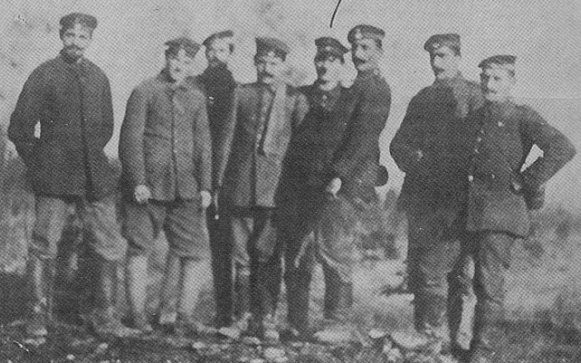
Hitler and his fellow dispatch runners
1916 World War I: List Regiment: (Sep 24-26): Gefreiter Adolf Hitler's 16th RIR is relieved by the 19th Bavarian Infantry Regiment, which is just back from the Somme, and whose men are telling horror stories about the fighting there. The 16th RIR are given a two day rest before being sent off to the Somme themselves. [For further details, Click here.]
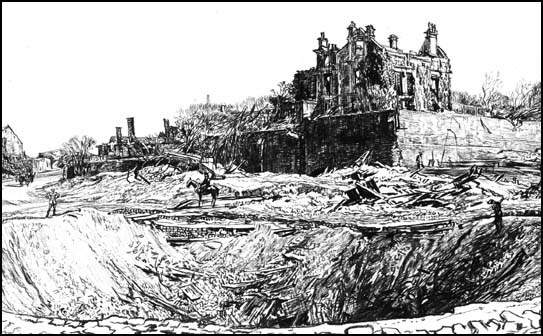
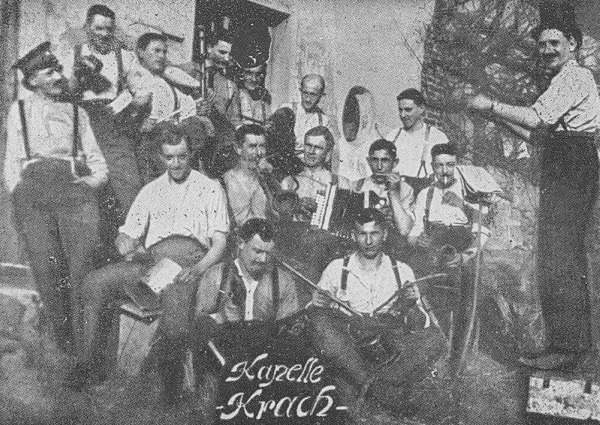
1919 US President Woodrow Wilson, on a speaking tour in support of the Treaty of Versailles, suffers a stroke
My fellow citizens, it is only certain bodies of foreign sympathies, certain bodies of sympathy with foreign nations that are organized against this great document which the American representatives have brought back from Paris. Therefore, in order to clear away the mists, in order to remove the impressions, in order to check the falsehoods that have clustered around this great subject, I want to tell you a few very simple things about the treaty and the covenant. Do not think of this treaty of peace as merely a settlement with Germany. It is that. It is a very severe settlement with Germany, but there is not anything in it that she did not earn.
Edith Bolling Galt, President Wilson's second wife, becomes President of the US in all but name as the Presidents condition is far worse than is publicly admitted. She will continue Wilson's no compromise policy on the European peace treaty and the League of Nations plan attached to it, thereby ensuring its ultimate defeat.
1923 Adolf Hitler addresses a meeting of the heads of all the right-wing military formations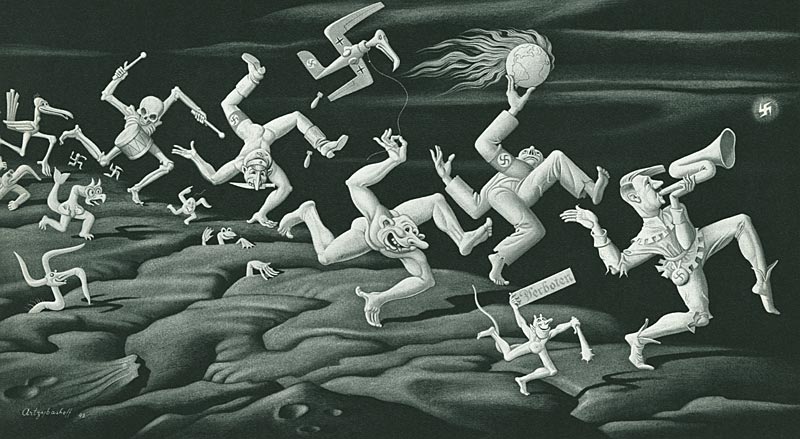
1933 Zionism: The Relief Conference for German Jews, meeting in Rome under the chairmanship of Chaim Weizmann, adopts a resolution to open special offices in Jerusalem and London dealing with settlement of German Jewish refugees in Palestine.
In 1921 Weizmann was elected president of the World Zionist Organization, a post he held until 1931 and later from 1935 to 1946. When the Jewish Agency for Palestine was established in 1929, he served simultaneously as its president. In this dual capacity, he cooperated with Great Britain except for a time in 1930, when he resigned from his Zionist post in protest against the new British policy curtailing Jewish immigration from Palestine. [For further details, Click here.]
1937 Mussolini and Hitler meet in Berlin (Sep 25-28):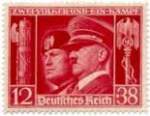
From this days Capitalist International: In the fight against the Spanish government, German dictator Adolf Hitler and Italian dictator Benito Mussolini have behind them what is probably the most powerful and respected group of men in the world in 1935, called the international of world capitalism. Many of the men in this group are English, and their stakes in Spain raise the question that which way are Britain's financial and imperial interests inclining it [Sic]. The fact is that an international combination of capitalists is pushing Britain into a union with fascism, and in this group are not only the owners of the choicest properties in the Empire but even those who demand an alliance with the France of the Popular Front.
1938 Sudeten Crisis: The French government changes its position on the Anglo-French plan, committing itself to defend Czechoslovakia if the Germans attack.During the September campaign the Luftwaffe used all available aircraft to drop bombs on Warsaw since the beginning of the war, including even obsolescent Junkers Ju-52/3m bombers. About 1,150 bombing sorties by German aircraft were flown against Warsaw on September 25, 1939, in an effort to terrorize the defenders into surrendering. 500 tons of high explosive bombs and 72 tons of incendiary bombs were dropped on the city. The Germans did not hesitate to bomb civilian targets and hospitals marked with the Red Cross symbol. However, not all bombs found their intended target as some bombers dropped their load in error on German troops in the northwestern suburbs of the city. [For further details, Click here.]
Sep-Oct: Germany annexes the northern and western portions of German-occupied Poland, including provinces Germany had been forced to give up by the Treaty of Versailles. The southern and eastern portions become an occupied zone, in effect a German colony, designated as the Government General of Poland. (THP)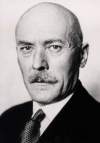
Stalin and Molotov asked me to come to the Kremlin at 8 p. m. today. Stalin stated the following:
In the final settlement of the Polish question anything that in the future might create friction between Germany and the Soviet Union must be avoided. From this point of view, he considered it wrong to leave an independent Polish rump state. He proposed the following: From the territory to the east of the demarcation line, all the Province of Lublin and that portion of the Province of Warsaw which extends to the Bug should be added to our share. In return, we should waive our claim to Lithuania. Stalin designated this suggestion as a subject for the forthcoming negotiations with the Reich Foreign Minister and added that, if we consented, the Soviet Union would immediately take up the solution of the problem of the Baltic countries in accordance with the Protocol of August 23, and expected in this matter the unstinting support of the German Government. Stalin expressly indicated Estonia, Latvia, and Lithuania, but did not mention Finland. I replied to Stalin that I would report to my Government.
1940 World War II: Various:Ribbentrop to Molotov:

This alliance [a proposed German-Japanese Pact] is directed exclusively against the American warmongers. To be sure that is, as usual, not expressly stated in the treaty, but can be unmistakably inferred from its terms. Its exclusive purpose is to bring the elements pressing for America's entry into the war to their senses by conclusively demonstrating to them if they enter the present struggle they will automatically have to deal with the three great powers as adversaries. (IMT)
[See: Countdown to Infamy: Timeline to Pearl Harbor.] Norway: King formally deposed and Quisling appointed to lead the new Norwegian government:
Quisling became a quisling when the war came to Norway and he took control over Norway. From that moment on his name was forever stained. This is a tragedy for the rest of his family, because he came from an old and distinguished family, a good family that even old people today speak about with respect. Symbols and expressions within N.S. were taken from Norwegian Viking traditions. The main N.S. symbol was an encircled Golden Cross on red background, the St. Olav's Cross. They also reinstalled old names and functions dating back to the Viking Age: the Hird was to be the hard-core political uniformed storm troops of NS, and equivalent to the German SA. [For further details, Click here.]
Battle of Dakar: An attack by Free French forces landed by ships of the Royal Navy against the west African port of Dakar is repulsed by Vichy troops.The strategic importance of Dakar (Senegal) in the British eyes can not be underestimated. It would be a base much more useful than Freetown to protect the convoys circumnavigating Africa from England to the Middle-East. At that time, the Free French were successful rallying parts of the French colonial empire, like in Noumea and New Caledonia or Camerun. In Dakar though, Governor Boisson refused flatly any rallying offer by the De Gaulle and did not shy away from a confrontation with the Royal Navy. The fighting lasted for three days and the losses were high on both sides. [For further details, Click here.]
1941 Various:The siege lasted for a total of 900 days, from September 8 1941 until January 27 1944. The city's almost 3 million civilians (including about 400,000 children) refused to surrender and endured rapidly increasing hardships in the encircled city. Food and fuel stocks were limited to a mere 1-2 month supply, public transport was not operational and by the winter of 1941-42 there was no heating, no water supply, almost no electricity and very little food. [For further details, Click here.]
[See: Was Adolf Hitler a 'Great' Military Leader?] Hitler speaks of extending Europe to the Ural Mountains and creating a human barrier against Asia. (THP)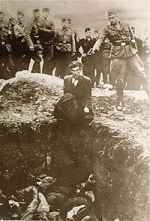
On this day in 1942, British bombers attempt to take out the local headquarters of the German secret state police, the Gestapo, in Norway. They miss--but send some Nazis running for their lives . . . .
One means of keeping defiant locals of newly occupied countries under control was the use of the Gestapo. An office was typically set up in conquered nations to terrorize the populace. On September 25, during a Nazi Party rally in Oslo, British aircraft, aiming to destroy the records of the Norwegian Resistance (kept in Gestapo headquarters, but not as yet acted upon), bombed the building. The bombs missed their target, but surrounding buildings were hit, and four people were killed. The [British] did put a scare into the Nazis, though, who ran from the city, leaving their Party's rally in ruins. [For further details, Click here.]
It is important to mention that Jews were not the only minorities targeted by Romanians. Gypsies were also affected by the Holocaust, with twenty six thousand deported, around seven thousand massacred, and three thousand starved to death. (The Sword of the Archangel, chapter 6) They were not viewed as enemies of Romania, but inferior creatures that had to be killed in order to keep the Romanian race pure. However, the Romanian Jews were most affected during WWII, with the second largest number, after Germany, killed and tortured. The Antonescu regime feared that the Jews would ally with the Russians and fight against the Romania. Even before WWII, laws were passed to ensure that Jews were not treated as equal citizens, with the belief that they were inferior creatures that caused diseases and disaster. Therefore the Antonescu regime, with the Iron Guard in the few months that they were in power, felt justified in killing a large number of Jews during Holocaust. [For further details, Click here.]
Holocaust: An instruction to Swiss police states: "Under current practice, refugees on the grounds of race alone are not political refugees." (THP)Staged almost simultaneously with the Battle of the Dnieper, the offensive lasted 2 months and was led by Generals Andrei Yeremenko and Vasily Sokolovsky. It was aimed at clearing the German presence from the Smolensk and Bryansk regions. Smolensk had been under German occupation since the first Battle of Smolensk in 1941. Despite an impressive German defense, the Red Army was able to stage several breakthroughs, liberating several major cities including Smolensk and Roslavl. They moved into occupied Belorussia. However, the overall advance was quite modest and slow.
1944 World War II: The US 82nd and 101st divisions are driven back across the Rhine.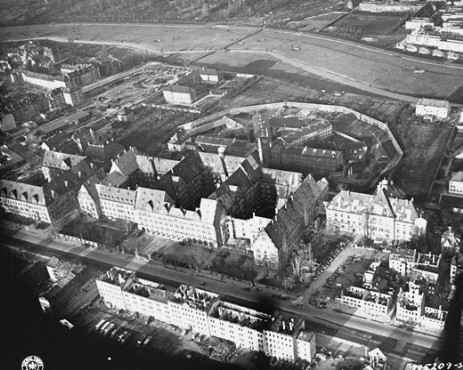
1946 Nuremberg Tribunal
: The justices continue to discuss verdicts in the Major War Criminals Trial. (See: 30 September 1946) 1946 Death: Hans Eppinger: Austrian physician and war criminal. During World War II he gained an infamous reputation due to his experiments on prisoners at Dachau. Following the war he committed suicide, reportedly using poison. This occurred a month before he was to be called to testify at the Nuremberg Trials. Much later, it was discovered that he had an unclaimed Swiss bank account.Soviet leader Nikita Khrushchev caps his trip to the United States with two days of meetings with President Dwight D. Eisenhower. The two men came to general agreement on a number of issues, but a U-2 spy plane incident in May 1960 crushed any hopes for further improvement of U.S.-Soviet relations during the Eisenhower years. [For further details, Click here]
1968 Death: Hans Guenther: social anthropologist and leading ideologist of Nazi racialism. His many books sold hundreds of thousands of copies in Germany and continued the work of earlier racial theorists such as Arthur de Gobineau and Houston Stewart Chamberlain. His Short Ethnology of the German People sold more than 270,000 copies between 1929 and 1943 and established new criteria for defining the racial IDEAL Rassengemisch (racial mixture) in which the "physical and spiritual hereditary endowments of non-European peoples are predominant." Guenther depicted the Nordic race as the great creative force in history whose threatened mongrelization would endanger the future civilization unless its ranks are eugenically purged of all disintegrating influences. Foremost of these were the "non-European Jews, a mixture of Asiatic and Oriental stock, responsible for such decomposing ideas as liberalism, democracy, and socialism." In a case of garbage-in, garbage-out, these pseudoscientific race theories were used by the Nazis to justify the Nuremberg Laws and other legislation aimed at 'strengthening' the German race, as well as providing the 'intellectual foundation' for the tragic events of the Holocaust. (THP)
Klaus Barbie was born in Bad Godesberg, Germany in 1913. He joined the Nazi Party in 1932 and three years later became a member of the SS (Schutzstaffel). In 1935 Barbie was assigned to the SD Security Service. Soon after the outbreak of the Second World War Barbie was promoted to second lieutenant and was with a SD detachment during the Western Offensive. In November 1940 he became an SS Obersturmfuehrer and moved to Holland where he served in the Central Bureau for Jewish Emigration.
In June 1942 Barbie was transferred to Dijon in France to take up a post with the SD Security Service. In November 1942, the Germans reoccupied Lyons and Barbie established an office in Hotel Terminus. The following year he moved to offices and specially built torture chambers in the Ecole de Sante Militaire. On 7th June 1943, Barbie captured René Hardy, a member of the French Resistance who had successfully carried out several acts of sabotage against the Germans. Barbie eventually obtained enough information to arrest Jean Moulin, Pierre Brossolette, and Charles Delestraint. Moulin and Brossolette both died while being tortured and Delestraint was sent to Dachau where he was killed near the end of the war.
As Allied troops approached Lyons in September 1944, Barbie destroyed Gestapo records and killed hundreds of Frenchmen who had first-hand knowledge of his brutal interrogation methods. This included twenty double-agents who had been supplying his with information about the French Resistance. Barbie fled back to Nazi Germany where he was recruited by the US Counter-Intelligence Corps (CIC). Barbie impressed his American handlers by infiltrating the Bavarian branch of the Communist Party. According to the CIC Barbie's "value as an informant infinitely outweighs any use he may have in prison" . . . .
In March, 1951, Barbie was smuggled out of Germany and given a new life in Bolivia. In 1957 he acquired Bolivian citizenship under the pseudonym Klaus Altmann. It was not until 1983 that Nazi hunters were able to find Barbie and have him extradited to France. He was found guilty of crimes against humanity. This included the execution of men, women, and children as hostages, torture, and the deportation of 842 from Lyons to Nazi Germany. Found guilty he was sentenced in 1987 to life imprisonment.
Klaus Barbie died of leukemia in the prison hospital at Lyons on 25th September 1991. [For further details, Click here.]
Edited by Levi Bookin (Copy editor) Click to join 3rdReichStudies Disclaimer: This site includes diverse and controversial materials--such as excerpts from the writings of racists and anti-Semites--so that its readers can learn the nature and extent of hate and anti-Semitic discourse. It is our sincere belief that only the informed citizen can prevail over the ignorance of Racialist "thought." Far from approving these writings, this site condemns racism in all of its forms and manifestations.
levi.bookin@gmail.com










Fair Use Notice: This site may contain copyrighted material the use of which has not always been specifically authorized by the copyright owner. We are making such material available in our efforts to advance understanding of historical, political, human rights, economic, democracy, scientific, environmental, and social justice issues, etc. We believe this constitutes a "fair use" of any such copyrighted material as provided for in section 107 of the US Copyright Law. In accordance with Title 17 U.S.C. Section 107, the material on this site is distributed without profit to those who have expressed a prior interest in receiving the included information for research and educational purposes. If you wish to use copyrighted material from this site for purposes of your own that go beyond 'fair use', you must obtain permission from the copyright owner.
Please Note: The list-owner and moderators of 3rdReichStudies are not responsible for, and do not necessarily approve of, the random ads placed on our pages by our web server. They are, unfortunately, the price one pays for a 'free' website.



